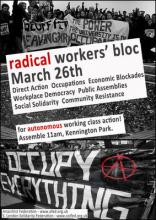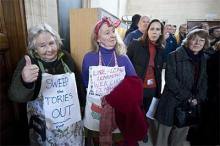Brighton SolFed to join Radical Workers on March 26
On Saturday 26th March the Trades Union Congress has called for a march against the cuts, and there is going to be a South London feeder march starting at Kennington Park which we will be joining. We are calling on anarchists, libertarian communists and militant workers from across the country who agree with the principles of solidarity, direct action, and self-organisation to join us on the demonstration to provide a visible presence and a revolutionary alternative to the reformism of the TUC.




